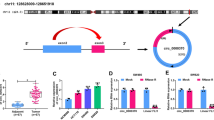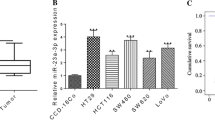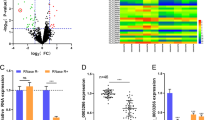Abstract
It has been reported the anti-tumor action of curcumin on colorectal cancer. In this study, we aimed to explore the potential mechanisms underlying curcumin in the development of colorectal cancer. CCK-8, EdU, flow cytometry, and transwell invasion assays were conducted to investigate the function role of curcumin in cell proliferation, apoptosis, and invasion. The level of miR-134-5p and CDCA3 was determined using RT-qPCR analysis. Western blot was applied for detecting the levels of c-myc, MMP9, CDCA3, and CDK1. Dual-luciferase reporter assay was used to evaluate the relationship between miR-134-5p and CDCA3, and IP assay was performed to examine the interaction between CDCA3 and CDK1. Additionally, SW620 cells were injected into the mice to form the xenograft tumor model. Curcumin treatment repressed cell growth and invasion, and induced cell apoptosis in HCT-116 and SW620 cells. Curcumin elevated miR-134-5p expression and restrained CDCA3 expression in HCT-116 and SW620 cells. MiR-134-5p inhibitor or CDCA3 overexpression could restore the effects of curcumin on cell growth, apoptosis, and invasion in HCT-116 and SW620 cells. MiR-134-5p targeted CDCA3, and CDCA3 could rescue the repressive effects of miR-134-5p on the progression of colorectal cancer. Moreover, CDCA3 interacted with CDK1, and CDK1 overexpression blocked the suppressive effects of CDCA3 downregulation on the development of colorectal cancer. In addition, curcumin treatment repressed tumor growth in colorectal cancer via increasing miR-134-5p and downregulating CDCA3 and CDK1 expression in vivo. Our findings provided the evidence that curcumin upregulated miR-134-5p to inhibit the progression of colorectal cancer by regulating CDCA3/CDK1 pathway.








Similar content being viewed by others
Data availability
The datasets used and analyzed during the current study are available from the corresponding author on reasonable request.
References
Adams MN, Burgess JT, He Y, Gately K, Snell C, Zhang SD et al (2017) Expression of CDCA3 is a prognostic biomarker and potential therapeutic target in non-small cell lung cancer. J Thorac Oncol 12(7):1071–1084
Balasubramanian S, Eckert RL (2007) Curcumin suppresses AP1 transcription factor-dependent differentiation and activates apoptosis in human epidermal keratinocytes. J Biol Chem 282(9):6707–6715
Bartel DP (2004) MicroRNAs: genomics, biogenesis, mechanism, and function. Cell 116(2):281–297
Cai G, Zou R, Yang H, Xie J, Chen X, Zheng C et al (2022) Circ_0084043-miR-134-5p axis regulates PCDH9 to suppress melanoma. Front Oncol 12:891476
Chandran B, Goel A (2012) A randomized, pilot study to assess the efficacy and safety of curcumin in patients with active rheumatoid arthritis. Phytother Res 26(11):1719–1725
Chen J, Zhu S, Jiang N, Shang Z, Quan C, Niu Y (2013) HoxB3 promotes prostate cancer cell progression by transactivating CDCA3. Cancer Lett 330(2):217–224
Chen X, Stauffer S, Chen Y, Dong J (2016) Ajuba phosphorylation by CDK1 promotes cell proliferation and tumorigenesis. J Biol Chem 291(28):14761–14772
Chi J, Liu T, Shi C, Luo H, Wu Z, Xiong B et al (2019) Long non-coding RNA LUCAT1 promotes proliferation and invasion in gastric cancer by regulating miR-134-5p/YWHAZ axis. Biomed Pharmacother 118:109201
Cole GM, Teter B, Frautschy SA (2007) Neuroprotective effects of curcumin. Adv Exp Med Biol 595:197–212
El-Daly SM, Abba ML, Patil N, Allgayer H (2016) miRs-134 and -370 function as tumor suppressors in colorectal cancer by independently suppressing EGFR and PI3K signalling. Sci Rep 6:24720
Ferlay J, Colombet M, Soerjomataram I, Mathers C, Parkin DM, Pineros M et al (2019) Estimating the global cancer incidence and mortality in 2018: GLOBOCAN sources and methods. Int J Cancer 144(8):1941–1953
Hu Z, Ding J, Ma Z, Sun R, Seoane JA, Scott Shaffer J et al (2019) Quantitative evidence for early metastatic seeding in colorectal cancer. Nat Genet 51(7):1113–1122
Jeong KE, Cairns JA (2013) Review of economic evidence in the prevention and early detection of colorectal cancer. Health Econ Rev 3(1):20
Kim J, Yao F, Xiao Z, Sun Y, Ma L (2018) MicroRNAs and metastasis: small RNAs play big roles. Cancer Metastasis Rev 37(1):5–15
Lee RC, Feinbaum RL, Ambros V (1993) The C. elegans heterochronic gene lin-4 encodes small RNAs with antisense complementarity to lin-14. Cell 75(5):843–854
Li W, Wang Z, Xiao X, Han L, Wu Z, Ma Q et al (2019) Curcumin attenuates hyperglycemia-driven EGF-induced invasive and migratory abilities of pancreatic cancer via suppression of the ERK and AKT pathways. Oncol Rep 41(1):650–658
Li J, Wei H, Liu Y, Li Q, Guo H, Guo Y et al (2020) Curcumin inhibits hepatocellular carcinoma via regulating miR-21/TIMP3 axis. Evid Based Complement Alternat Med 2020:2892917
Liu Y, Gao S, Du Q, Shao M (2019) miR-146a and miR-152 in prostate cancer and clinicopathological parameters. J BUON 24(4):1692–1699
Liu Y, Chen X, Liu J, Jin Y, Wang W (2022) Circular RNA circ_0004277 inhibits acute myeloid leukemia progression through MicroRNA-134-5p / single stranded DNA binding protein 2. Bioengineered 13(4):9662–9673
Luo Y, Wu Y, Peng Y, Liu X, Bie J, Li S (2016) Systematic analysis to identify a key role of CDK1 in mediating gene interaction networks in cervical cancer development. Ir J Med Sci 185(1):231–239
Mah SM, Buske C, Humphries RK, Kuchenbauer F (2010) miRNA*: a passenger stranded in RNA-induced silencing complex? Crit Rev Eukaryot Gene Expr 20(2):141–148
Man S, Zhang L, Cui J, Yang L, Ma L, Gao W (2018) Curcumin enhances the anti-cancer effects of Paris Saponin II in lung cancer cells. Cell Prolif 51(4):e12458
Pasquinelli AE, Reinhart BJ, Slack F, Martindale MQ, Kuroda MI, Maller B et al (2000) Conservation of the sequence and temporal expression of let-7 heterochronic regulatory RNA. Nature 408(6808):86–89
Passirani C, Vessieres A, La Regina G, Link W, Silvestri R (2022) Modulating undruggable targets to overcome cancer therapy resistance. Drug Resist Updat 60:100788
Sahu RP, Batra S, Srivastava SK (2009) Activation of ATM/Chk1 by curcumin causes cell cycle arrest and apoptosis in human pancreatic cancer cells. Br J Cancer 100(9):1425–1433
Singh MP, Rai S, Singh NK, Srivastava S (2021) Transcriptomic landscape of early age onset of colorectal cancer identifies novel genes and pathways in Indian CRC patients. Sci Rep 11(1):11765
Sridharan M, Hubbard JM, Grothey A (2014) Colorectal cancer: how emerging molecular understanding affects treatment decisions. Oncology (Williston Park) 28(2):110–118
Su J, Zhou X, Wang L, Yin X, Wang Z (2016) Curcumin inhibits cell growth and invasion and induces apoptosis through down-regulation of Skp2 in pancreatic cancer cells. Am J Cancer Res 6(9):1949–1962
Sun S, Fang H (2021) Curcumin inhibits ovarian cancer progression by regulating circ-PLEKHM3/miR-320a/SMG1 axis. J Ovarian Res 14(1):158
Tong H, Zhao K, Wang J, Xu H, Xiao J (2020) CircZNF609/miR-134-5p/BTG-2 axis regulates proliferation and migration of glioma cell. J Pharm Pharmacol 72(1):68–75
Uchida F, Uzawa K, Kasamatsu A, Takatori H, Sakamoto Y, Ogawara K et al (2012) Overexpression of cell cycle regulator CDCA3 promotes oral cancer progression by enhancing cell proliferation with prevention of G1 phase arrest. BMC Cancer 12:321
Wan Mohd Tajuddin WNB, Lajis NH, Abas F, Othman I, Naidu R (2019) mechanistic understanding of curcumin’s therapeutic effects in lung cancer. Nutrients 11(12):2989
Wang J, Wang X, Lin S, Chen C, Wang C, Ma Q et al (2013) Identification of kininogen-1 as a serum biomarker for the early detection of advanced colorectal adenoma and colorectal cancer. PLoS ONE 8(7):e70519
Wang Y, Yu J, Cui R, Lin J, Ding X (2016) Curcumin in treating breast cancer: a review. J Lab Autom 21(6):723–731
Wang H, Cai X, Ma L (2020a) Curcumin modifies epithelial-mesenchymal transition in colorectal cancer through regulation of miR-200c/EPM5. Cancer Manag Res 12:9405–9415
Wang N, Feng T, Liu X, Liu Q (2020b) Curcumin inhibits migration and invasion of non-small cell lung cancer cells through up-regulation of miR-206 and suppression of PI3K/AKT/mTOR signaling pathway. Acta Pharm 70(3):399–409
Weng W, Goel A (2022) Curcumin and colorectal cancer: an update and current perspective on this natural medicine. Semin Cancer Biol 80:73–86
Winter J, Jung S, Keller S, Gregory RI, Diederichs S (2009) Many roads to maturity: microRNA biogenesis pathways and their regulation. Nat Cell Biol 11(3):228–234
Wu Z, Zhao X, Sun Y, Yu H (2022) Curcumin suppresses colorectal cancer development with epithelial-mesenchymal transition via modulating circular RNA HN1/miR-302a-3p/PIK3R3 axis. J Physiol Pharmacol 73(2):219–231
Xi C, Ye NY, Wang YB (2020) LncRNA LINC01278 accelerates colorectal cancer progression via miR-134-5p/KDM2A axis. Eur Rev Med Pharmacol Sci 24(20):10526–10534
Xiao Y, Lucas B, Molcho E, Schiff T, Vigodner M (2016) Inhibition of CDK1 activity by sumoylation. Biochem Biophys Res Commun 478(2):919–923
Xue H, Wu Z, Rao D, Zhuo B, Chen Q (2020) Long non-coding RNA LINC00858 aggravates the oncogenic phenotypes of ovarian cancer cells through miR-134-5p/RAD18 signaling. Arch Gynecol Obstet 302(5):1243–1254
Yallapu MM, Maher DM, Sundram V, Bell MC, Jaggi M, Chauhan SC (2010) Curcumin induces chemo/radio-sensitization in ovarian cancer cells and curcumin nanoparticles inhibit ovarian cancer cell growth. J Ovarian Res 3:11
Yang C, Zhang G, Zhang Y, Zhang S, Li J, Liu Y (2021) Exosome miR-134-5p restrains breast cancer progression via regulating PI3K/AKT pathway by targeting ARHGAP1. J Obstet Gynaecol Res 47(11):4037–4048
Ye Q, Su L, Chen D, Zheng W, Liu Y (2017) Astragaloside IV induced miR-134 expression reduces EMT and increases chemotherapeutic sensitivity by suppressing CREB1 signaling in colorectal cancer cell line SW-480. Cell Physiol Biochem 43(4):1617–1626
Yoshida K (2005) Cell-cycle-dependent regulation of the human and mouse Tome-1 promoters. FEBS Lett 579(6):1488–1492
Zhang JY, Lin MT, Zhou MJ, Yi T, Tang YN, Tang SL et al (2015) Combinational treatment of curcumin and quercetin against gastric cancer MGC-803 cells in vitro. Molecules 20(6):11524–11534
Zhang W, Lu Y, Li X, Zhang J, Zheng L, Zhang W et al (2018) CDCA3 promotes cell proliferation by activating the NF-kappaB/cyclin D1 signaling pathway in colorectal cancer. Biochem Biophys Res Commun 500(2):196–203
Zhang L, Liao Y, Tang L (2019) MicroRNA-34 family: a potential tumor suppressor and therapeutic candidate in cancer. J Exp Clin Cancer Res 38(1):53
Zheng ZH, You HY, Feng YJ, Zhang ZT (2021) LncRNA KCNQ1OT1 is a key factor in the reversal effect of curcumin on cisplatin resistance in the colorectal cancer cells. Mol Cell Biochem 476(7):2575–2585
Zhou C, Hu C, Wang B, Fan S, Jin W (2020) Curcumin suppresses cell proliferation, migration, and invasion through modulating miR-21–5p/SOX6 axis in hepatocellular carcinoma. Cancer Biother Radiopharm. Ahead of print https://doi.org/10.1089/cbr.2020.3734
Zuo Z, Ji S, He L, Zhang Y, Peng Z, Han J (2020) LncRNA TTN-AS1/miR-134-5p/PAK3 axis regulates the radiosensitivity of human large intestine cancer cells through the P21 pathway and AKT/GSK-3beta/beta-catenin pathway. Cell Biol Int 44(11):2284–2292
Author information
Authors and Affiliations
Contributions
Q.Y. designed and supervised the study. F.L. conducted the experiments and drafted the manuscript. H.M. collected and analyzed the data. X.Z. contributed the methodology, operated the software, and edited the manuscript. All authors reviewed the manuscript. The authors declare that all data were generated in-house and that no paper mill was used.
Corresponding author
Ethics declarations
Ethics approval and consent to participate
This project has gained the approval of the Research Ethics Committee of Nanyang First People’s Hospital. The written informed consents were signed by each participated patients. The animal experiments were reviewed and authorized by the Ethical Committee of Nanyang First People’s Hospital.
Consent to participate
Not applicable
Conflict of interest
The authors declare no competing interests.
Additional information
Publisher's note
Springer Nature remains neutral with regard to jurisdictional claims in published maps and institutional affiliations.
Fu Liu and Chongmei Zhu are co-first authors.
Supplementary Information
Below is the link to the electronic supplementary material.

210_2023_2584_Fig9_ESM.png
Supplement Figure 1 Curcumin upregulated miR-134-5p to inhibit the progression of colorectal cancer. HCT-116 and SW620 cells were treated with curcumin, curcumin+anti-miR-NC, and curcumin+anti-miR-134-5P. (A) The EdU-positive HCT-116 and SW620 cells were measured using EdU assay. (B) Cell apoptosis was measured using flow cytometry. ***P < 0.001, and ****P < 0.0001. (PNG 743 kb)

210_2023_2584_Fig10_ESM.png
Supplement Figure 2 MiR-134-5p repressed the progression of colorectal cancer via targeting CDCA3. SW620 and HCT-116 cells were transfected with miR-NC, miR-134-5p, miR-134-5p+pcDNA, and miR-134-5p+CDCA3, respectively. (A) The EdU-positive HCT-116 and SW620 cells were determined using EdU assay. (B) Cell apoptosis was detected using flow cytometry. **P < 0.01, ***P < 0.001, and ****P < 0.0001. (PNG 758 kb)

210_2023_2584_Fig11_ESM.png
Supplement Figure 3 Curcumin inhibited the progression of colorectal cancer via modulating CDCA3. SW620 and HCT-116 cells were treated with curcumin, curcumin+pcDNA, and curcumin+CDCA3, respectively. (A) EdU assay was used to detect the EdU-positive HCT-116 and SW620 cells. (B) Flow cytometry was utilized to measure cell apoptosis. ***P < 0.001, and ****P < 0.0001. (PNG 787 kb)

210_2023_2584_Fig12_ESM.png
Supplement Figure 4 CDK1 overexpression could reverse the effects of CDCA3 on the progression of colorectal cancer. SW620 and HCT-116 cells were transfected with si-NC, si-CDCA3, si-CDCA3+pcDNA, and si-CDCA3+CDK1, respectively. (A) EdU assay was performed to determine the EdU-positive HCT-116 and SW620 cells. (B) Flow cytometry was conducted to assess cell apoptosis. **P < 0.01, ***P < 0.001, and ****P < 0.0001. (PNG 724 kb)
Rights and permissions
Springer Nature or its licensor (e.g. a society or other partner) holds exclusive rights to this article under a publishing agreement with the author(s) or other rightsholder(s); author self-archiving of the accepted manuscript version of this article is solely governed by the terms of such publishing agreement and applicable law.
About this article
Cite this article
Liu, F., Zhu, C., Ma, H. et al. Curcumin targets miR-134-5p to suppress the progression of colorectal cancer through regulating the CDCA3/CDK1 pathway. Naunyn-Schmiedeberg's Arch Pharmacol 397, 109–122 (2024). https://doi.org/10.1007/s00210-023-02584-5
Received:
Accepted:
Published:
Issue Date:
DOI: https://doi.org/10.1007/s00210-023-02584-5




